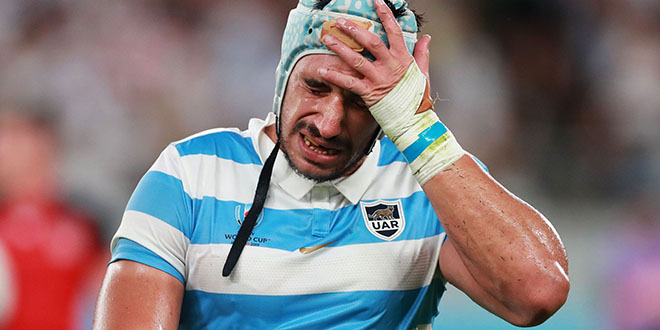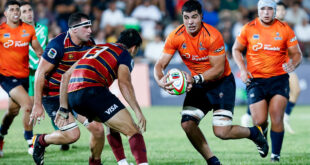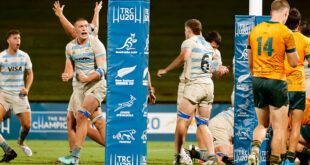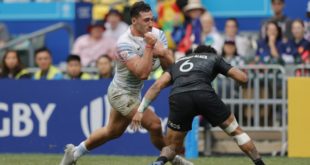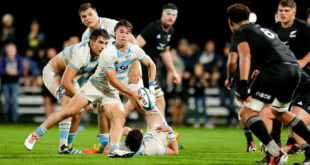For Argentina RWC 2019 will not require soul searching. There is no real need to do so as the answers are crystal clear as quite simply the Jaguares project failed. After three out of four pool matches Los Pumas have a return of one win and two losses, something never to have previous happened under the existing RWC model.
Post match Mario Ledesma was asked to compare RWC 2019 with that of RWC 2003. For Ledesma the Australia hosted tournament was his second of four as a player. Los Pumas opened by falling to Australia to then defeat Namibia, and Romania before being eliminated in a 16-15 loss against Ireland.
Ledesma’s response to the question was that they were very different campaigns with the 2019 side being far better prepared. Such a statement goes to show precisely how badly the team failed in Japan 2019. Argentina subdued and the team was eliminated early.
Jaguares and the Exit
The early exit came with one game yet to play and Ledesma said it is to officially be the start of the campaign for RWC 2023. Attention has already turned to who should and should not play in the match. Taking his comments at face value then the answer is youth with most older players to miss out.
Aged players were part of the problem for Argentina throughout the 2016-2019 cycle. The bigger problem, though was the policy of Jaguares until the end. Signing with the UAR meant a near guarantee of test opportunities. Consider Santiago González Iglesias who earned 22 caps from 2016-2018 yet was missing from the RWC training roster. In simple terms González Iglesias was not a sound investment.
During the same period Facundo Isa played 14 test matches. 12 of them were as a Jaguar and 2 while contracted to Toulon. He missed out on RWC selection with the official explanation being that he was not deemed to be certain of being in the match day 23 against France or England.
Starting in the N8 position in place of Isa was Javier Ortega Desio. In both matches he missed tackles from which the opposition scored tries and his ball-carrying was well short of the required standards of a Pumas N8 at a RWC. The advantage of his lineout work over that of Isa’s was why he was picked.
Isa vs Ortega Desio Numbers
As a ball-carrier Ortega Desio made no line-breaks from a total of 10 carries in Argentina’s three matches. This made him the 14th most of all of Argentina’s player for the number of carries. The leader was Kremer with 34 carries followed by Matera with 24 and Petti with 18. On defense Ortega Desio made 17 tackles compared to Kremer with 48, Matera with 28 and Petti with 28.
Playing N8 against Australia this year Isa made 7 tackles, 17 carries, defeated 5 defenders and scored a try. Against South Africa he made 11 carries, defeating 1 defender. Ortega Desio played flanker making 6 meters from 5 carries. Evidently selecting Javier Ortega Desio over Facundo Isa does not make sense.
It goes without saying that the selection policy will need to be reconsidered. The question for 2020-2023 needs to be how many players based abroad should be permitted in a match day 23?
Without an official policy the problems will not go away. Daniel Hourcade overused many players who missed out on RWC 2019 selection while under Ledesma there was Ortega Desio over Isa as well as center Matías Moroni playing wing with Santiago Cordero and Juan Imhoff not selected.
Moroni vs Cordero and Imhoff Numbers
Moroni’s defense conceded three tries by England and one by each of France and Tonga. He scored 1 try from 3 starts while Santiago Carreras scored 1 try from two starts. Carreras made 22 carries compared to Moroni’s 14 and Carreras 6 line-breaks compared to Moroni’s 3. The superior attacker was the rookie.
At RWC 2015 Moroni scored 2 tries, of which the second was from an assist from Santiago Cordero. Imhoff scored 5 in the tournament and Cordero 3. Cordero was Argentina’s leading carrier with 64 compared to 36 by Moroni, and 27 by Imhoff. Moroni had 6 line-breaks while Imhoff made 10 and Cordero 13. Consider then that Moroni did not convert Urdapilleta’s early cross-kick against England into a try. Logic and statistics suggest Cordero had a better chance at scoring from that play than Moroni.
Myths
Early myths to correct are that Argentina lost because of Tomás Lavanini’s red card, and that they lost because Gonzalo Quesada can coach them as Jaguares but Ledesma cannot get them working well as Pumas. The numbers above show that the workrate of forwards was not sufficient while the style of play under Ledesma is very similar to that of Quesada’s Jaguares.
For Jaguares this year Ortega Desio was the second line-out option after Petti. This continued in the RWC though all of Kremer, Lavanini and Lezana have been reliable in the air.
By selecting in single areas teams can give their opponents an edge. Consider New Zealand’s non-selection of Owen Franks. He was dropped due to him being excellent in the scrum but considered ineffective around the park. A lesson from this is the performances of Nahuel Tetaz Chaparro. He defended well and did well in the scrum yet has not carried well and committed a knock-on to miss a likely try vs France.
A related myth is that of invaluable experience. What Juan Manuel Leguizamón adds to the locker room can be found from various other forms. How about Isa and Cordero’s years in England? Or their prior RWC and Rugby Championship years? Francisco Gorrissen was not ahead of Leguizamón in Super Rugby by chance.
What is good for Jaguares is not necessarily what is best for Argentine rugby. Giving preference to local players can see them put in wrong Positions ala Moroni on the wing. It also is restrictive as a game plan. Jerónimo de la Fuente and Matías Orlando in the centers meant there was no Juan Martín Hernández, Felipe Contepomi, or Marcelo Bosch as a second play maker.
The style of play can be criticized but it was more about who was not selected than Ledesma’s game plan. Competing at the breakdown was a strength in 2015 but in 2019 Agustín Creevy is 34, and there is no Juan Martín Fernández Lobbe player to call-upon.
Looking ahead it is time to make humble considerations. This can be done through adjusting not only selection policies but also UAR relations. It is time to consider having capped test matches and not the Argentina XV in the Americas Rugby Championship (ARC); and it is time to have an annual capped test match against Uruguay and to schedule many more games against Georgia and Italy.
 Americas Rugby News Rugby news from across the Americas!
Americas Rugby News Rugby news from across the Americas!
